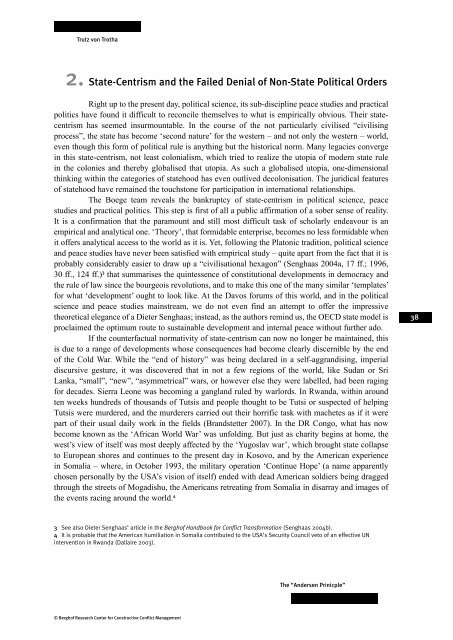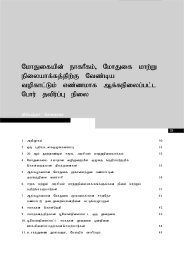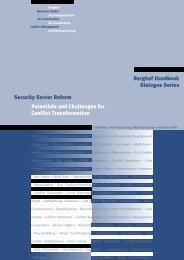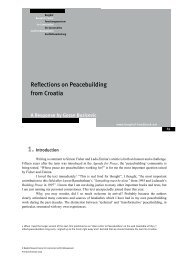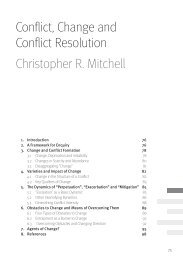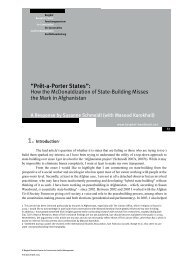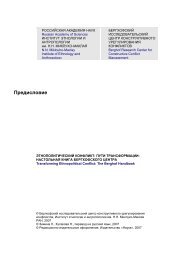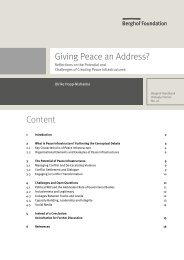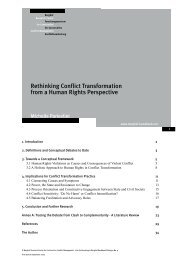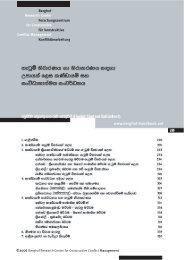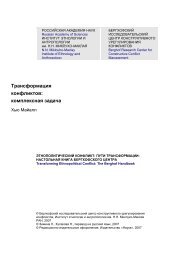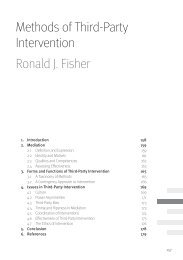Andersen Principle - Berghof Handbook for Conflict Transformation
Andersen Principle - Berghof Handbook for Conflict Transformation
Andersen Principle - Berghof Handbook for Conflict Transformation
You also want an ePaper? Increase the reach of your titles
YUMPU automatically turns print PDFs into web optimized ePapers that Google loves.
Trutz von Trotha<br />
2. State-Centrism and the Failed Denial of Non-State Political Orders<br />
Right up to the present day, political science, its sub-discipline peace studies and practical<br />
politics have found it difficult to reconcile themselves to what is empirically obvious. Their statecentrism<br />
has seemed insurmountable. In the course of the not particularly civilised “civilising<br />
process”, the state has become ‘second nature’ <strong>for</strong> the western – and not only the western – world,<br />
even though this <strong>for</strong>m of political rule is anything but the historical norm. Many legacies converge<br />
in this state-centrism, not least colonialism, which tried to realize the utopia of modern state rule<br />
in the colonies and thereby globalised that utopia. As such a globalised utopia, one-dimensional<br />
thinking within the categories of statehood has even outlived decolonisation. The juridical features<br />
of statehood have remained the touchstone <strong>for</strong> participation in international relationships.<br />
The Boege team reveals the bankruptcy of state-centrism in political science, peace<br />
studies and practical politics. This step is first of all a public affirmation of a sober sense of reality.<br />
It is a confirmation that the paramount and still most difficult task of scholarly endeavour is an<br />
empirical and analytical one. ‘Theory’, that <strong>for</strong>midable enterprise, becomes no less <strong>for</strong>midable when<br />
it offers analytical access to the world as it is. Yet, following the Platonic tradition, political science<br />
and peace studies have never been satisfied with empirical study – quite apart from the fact that it is<br />
probably considerably easier to draw up a “civilisational hexagon” (Senghaas 2004a, 17 ff.; 1996,<br />
30 ff., 124 ff.) 3 that summarises the quintessence of constitutional developments in democracy and<br />
the rule of law since the bourgeois revolutions, and to make this one of the many similar ‘templates’<br />
<strong>for</strong> what ‘development’ ought to look like. At the Davos <strong>for</strong>ums of this world, and in the political<br />
science and peace studies mainstream, we do not even find an attempt to offer the impressive<br />
theoretical elegance of a Dieter Senghaas; instead, as the authors remind us, the OECD state model is<br />
proclaimed the optimum route to sustainable development and internal peace without further ado.<br />
If the counterfactual normativity of state-centrism can now no longer be maintained, this<br />
is due to a range of developments whose consequences had become clearly discernible by the end<br />
of the Cold War. While the “end of history” was being declared in a self-aggrandising, imperial<br />
discursive gesture, it was discovered that in not a few regions of the world, like Sudan or Sri<br />
Lanka, “small”, “new”, “asymmetrical” wars, or however else they were labelled, had been raging<br />
<strong>for</strong> decades. Sierra Leone was becoming a gangland ruled by warlords. In Rwanda, within around<br />
ten weeks hundreds of thousands of Tutsis and people thought to be Tutsi or suspected of helping<br />
Tutsis were murdered, and the murderers carried out their horrific task with machetes as if it were<br />
part of their usual daily work in the fields (Brandstetter 2007). In the DR Congo, what has now<br />
become known as the ‘African World War’ was unfolding. But just as charity begins at home, the<br />
west’s view of itself was most deeply affected by the ‘Yugoslav war’, which brought state collapse<br />
to European shores and continues to the present day in Kosovo, and by the American experience<br />
in Somalia – where, in October 1993, the military operation ‘Continue Hope’ (a name apparently<br />
chosen personally by the USA’s vision of itself) ended with dead American soldiers being dragged<br />
through the streets of Mogadishu, the Americans retreating from Somalia in disarray and images of<br />
the events racing around the world. 4<br />
3 See also Dieter Senghaas’ article in the <strong>Berghof</strong> <strong>Handbook</strong> <strong>for</strong> <strong>Conflict</strong> Trans<strong>for</strong>mation (Senghaas 2004b).<br />
4 It is probable that the American humiliation in Somalia contributed to the USA’s Security Council veto of an effective UN<br />
intervention in Rwanda (Dallaire 2003).<br />
© <strong>Berghof</strong> Research Center <strong>for</strong> Constructive <strong>Conflict</strong> Management<br />
The “<strong>Andersen</strong> Prinicple”<br />
38


